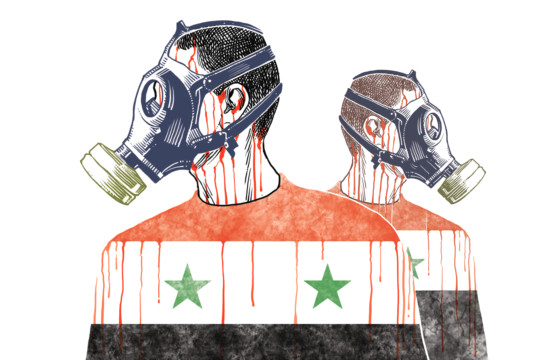
Three years ago, after 40 years of oppression under a dictatorship, Syrians dared to dream. Not only did they speak out, they screamed: “Syria wants freedom!” And ever since that day, they’ve been subjected to daily killing.
We all remember the horror that hit America after the September 11, 2001, attacks. That terrorist act ended nearly 3,000 innocent lives and left thousands of others with lifelong scars. Millions around the globe, including Syrians, felt America’s pain. Remember the hardship and bitterness as people around the World Trade Center gaped in shock, with smoke clouding around them and the loud noise of fear and panic ringing through the air?
In the past three years, about 150,000 Syrians have died — that’s like living through a September 11 attack every 21 days. It is no longer news when an activist dies under torture.
Outside Syria, many people might feel sad, but in the end the rest of the world just watches from afar. They don’t smell the stench of death or hear the cries of pain. They might be astonished by Syrians’ patience and our ability to withstand such circumstances, but they do little for us. Instead, they have gotten accustomed, just like Syrians have, to the idea of living through death and terror. Like millions, I was forced to leave my homeland and my memories. For the past two years, I have been living in Beirut without knowing when I will be back in Damascus.
In the early days, government officials around the world condemned the shelling of civilians. When it looked like chemical weapons had been used, the United States almost intervened. Destruction became the norm until rebel areas were flattened. City skylines were erased and replaced with open spaces and piles of rubble. Do you fear jihadists and terrorists? We all do. Do you know that President Bashar Al Assad’s “secular” regime let dozens of Islamists out of jail while detaining political prisoners and those supporting the uprising? This same government arrests and jails founders of civil and secular organisations because they threaten the survival of a regime that believes the Al Assad family is the only legitimate authority in Syria.
Once the US and Russia made a deal to put Syrian chemical weapons under international control, the world’s attention was diverted. The tragedy became just like a touching photograph: You look at it, and it evokes sympathy, but you do not know what is going on beyond the frame. You see the image of a member of Jabhat Al Nusra, which is affiliated with Al Qaida, killing a man or a child, or even a woman. But you can’t see what was happening a few yards or tens of miles away.
Not mere numbers
In Syria’s neighbouring countries there are 2.5 million refugees registered with UN agencies. More than six million people have fled their homes but remain inside Syria, and according to UN figures, nearly half the Syrian population is in need of humanitarian aid. Imagine if more than 155 million Americans were in such need only because they asked for dignity, freedom and democracy. Syrians aren’t mere numbers. They are humans who have dreams, families and feelings.
In Lebanon’s Bekaa Valley, which borders Syria, I met a tall, thin Syrian refugee in her 30s, wearing a long, loose dress. She carried a child who was barely a year old. She had twins and was pregnant with her third child when the Ghouta region, a suburb of Damascus, was hit with chemical weapons. She escaped to the Lebanon border and discovered that she was carrying only one child. When she arrived in Bekaa, she delivered her third child in a tent.
I asked her, “Do you know where your other child is?” She nodded and said: “He’s lost.”
If that woman were living in the US, we would probably see her on Oprah telling her tragic story while the audience fought back tears. Viewers would also cry, whether they were watching in the US or France, Sudan or even Syria.
In Syria, every moment, people are losing their loved ones, their children, their friends. Don’t forget us. Watch our pain. Our lives are on display for those who want to watch. Watch as much as you can bear. But remember that we are being killed, our homes are being destroyed, and we are forced to flee and live in tents. Don’t forget that even though we are hungry, we have dignity. Remember that we’ve lived our entire lives as numbers and cards that the regime plays in its small and big wars, domestically and internationally.
We know that President Barack Obama was reelected for domestic reasons and that Americans are tired of foreign policy. But we hope that the people of Syria will not be forgotten. Syrians have a dream to live in a democracy and choose our own leader. We have a dream to not be killed. Is that so hard?
— Washington Post
Dima Wannous, the author of The Chair, is a novelist based in Beirut.









